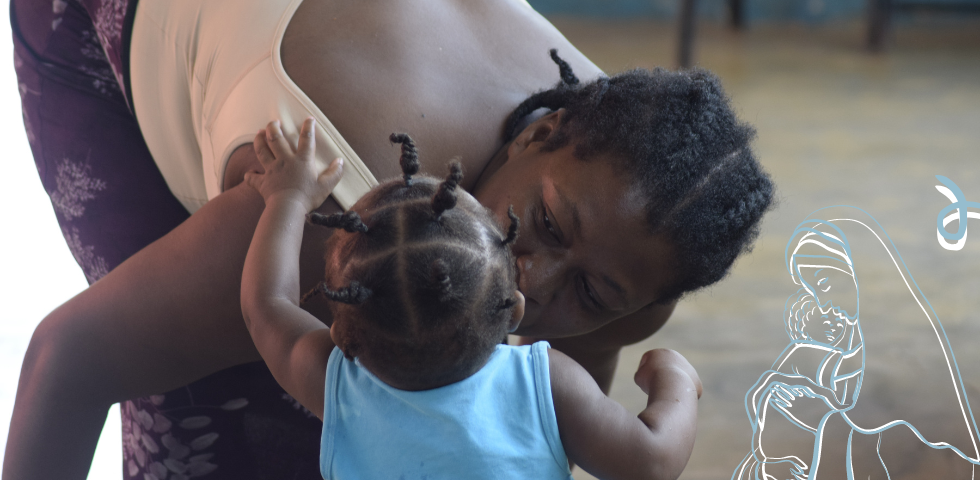In May, the celebration of Mother’s Day is combined with the Marian month that we Catholics celebrate. For the past several decades in these lands of Central America, mothers have lived the experience of uprooting that comes from separation from loved ones.
They are mothers, daughters, wives, and friends who left as migrants or stayed at home, all carrying the prayer that God will take care of their loved ones. It is with this motivation in the heart that mothers continue to leave, looking for their loved ones on the migratory route. In this reflection, I attempt to describe the reality of the migrant mother.
The Mother’s Caravan
After 16 years of searching and collective resistance, the “caravan of Central American mothers” traveled the Mexican territory in search of their sons, daughters, and loved ones who were forced to leave their homes due to violence, impoverishment, or the despair of not having a decent life. After two years of absence due to the pandemic, again this year from May 1 to 10, more than 40 mothers and fathers walked the roads of Mexico shouting, demanding, and expressing the disappearance of their loved one in those lands, where each migrant with irregular status is considered “illegal, enemy, and an invader.” This designation is motivated by the xenophobic and racist mentality of state policies, and that has become normalized in many residents. A journalistic note says of this caravan that:
In the “XVI Caravan of Central American Mothers: “We have never left,” as they look for their disappeared sons and daughters in their transit through Mexico to the United States, placed a floral offering this Tuesday (May 3rd) on a section of the Chiapa de Corzo – Tuxtla Gutiérrez road, where last December 9th, 56 migrants died of injuries and more than 100 were injured when the overcrowded trailer in which they were traveling overturned on a curve.”
Watch the video tribute to the caravan of mothers of migrants and the disappeared
Mothers on the migratory route of Latin America
For some years, this migratory flow has been covering the entire territory of Central America, It is a migration that comes from South America, where hundreds of Haitian, Venezuelan, Colombian, and transcontinental migrants cross the inhospitable jungle of the Darien Gap in Panama, thus beginning a journey through these countries in search of reaching North America, the main goal for most migrants.
On this journey, it is painful to see the faces of the mothers with their sons and daughters, who with courage and fragility are advancing through our lands in Central America. This year when I was in the “Gualaca” refuge in Chiriquí, where migrants are transferred from the Darien Gap by officials of the Panamanian state; I observed groups of families and the mothers who with their children are willing to face all the dangers that will arise in these countries. They are faces of a pain and sadness that, mixed with hope and resistance, moves them to continue searching for a better quality of life.
You can watch this video about mothering and migrating:
Girls and women in this migratory ordeal
We know that mothers and girls, as women, bear the brunt of this migratory journey. In this situation of vulnerability are the “unaccompanied” minors who have been fleeing the violence in their countries of origin: “between January and September 2021, the flow of foreign children and adolescents traveling alone was 9,585, coming especially from Guatemala (4,815), Honduras (3,480), El Salvador (1,033) and, in a smaller proportion, from nations such as Haiti, Peru, and Ecuador (257).” As we “feel-think” as the heart of mothers who know that their “minor” is traveling alone on the migratory path, our prayers to God must be endless. Another outrageous component of this is the immigration policies of the governments of Mexico and the United States, which continue to exclude women in their asylum applications.

Month of May dedicated to the Mother
In the month of May several countries celebrate “Mother’s Day,”, and many joyous festivities are held in the family, in educational centers and in institutions, showing the relevance of mothers in society. In a religious context, Mother’s Day refers to Mary as the Mother of Christians and is observed and celebrated in May.
In our small towns, the relevance of the figure of the woman as mother is typical, both for her presence and for her role in the family. However, in daily family and social practice, denigration and violence against women are on the rise in these countries. These violent acts are motivated by machismo that dehumanizes a man’s masculinity. This macho behavior that is present in these cultures is an abominable shadow that accompanies the migrant woman.
The memory of Mary the Mother of Jesus
Memorialized in the Gospels, we have the figure of the woman, wife, and mother Mary, who in our Catholic faith we believe is present in the history and life of every believer. The Gospel of Matthew narrates, with theological symbolism, the event of the flight of the family from Nazareth, where Matthew’s narration retells the story that the holy family was forced to migrate to foreign lands, because of persecution by Herod. Herod symbolizes all the powerful historical systems that seek to kill the innocent and defenseless (Mt 2,:13–15).
Celebrating the memory of our mothers and the presence of the Virgin Mary as Mother of Christian believers leads us to increase our faith in the mystery of God Incarnate in human history, and to believe that God took human form the Son, with the same vulnerability to persecution like families being forced to migrate and seek refuge. God loved the world so much that he took on the condition of the victims, that is, of the mothers and men forced to migrate.
We leave you our article from the previous year:
Migrant woman: an indelible mark for history
Questions for reflection
How do we celebrate the Virgin Mary as a woman and mother in these times of migrant mothers and women? What is our Christian reaction to the drama of the mother who cries out for her migrant sons and daughters? Where is our Christian faith and praxis, praying to Mary, a migrant mother?
Let us know in the comments how you liked this article, oh yes and a very happy Mother’s Day to all the mothers of our Latin America!
Br. Rene Flores, OFM. Salvadoran, franciscan friar, lay option. Member of the franciscan province, “Our Lady of Guadalupe”, of Central America, and foundation in Haiti.
Animator and head of JPIC-OFM in Panama, Member of the RFM in Panama, Experience in management and administration of educational centers (19 years), animator and facilitator of JPIC teams (16 years), Coordinator and facilitator of training processes with agents of pastoral (35 years).
Bachelor of theology. UCA, El Salvador
Diploma in educational administration. URLs. Guatemala
Master’s degree in educational research. UCA. El Salvador
Diploma in political incidence in Human Rights. UCA. El Salvador
Studies at the Superior School of Franciscanism, ESEF. Madrid. Spain.
He currently resides in La Pintada, Panama.


